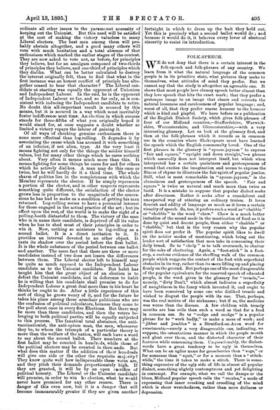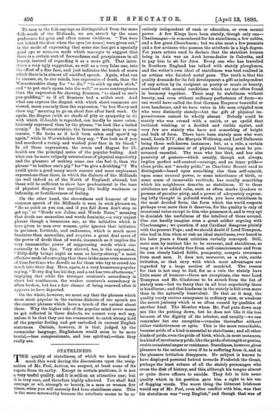FOLK- SPEE CH.
WE do not deny that there is a certain interest in the folk-speech and folk-phrases of any country. We learn from it what the natural language of the common people is in its primitive state, what pictures they make to themselves, what attitudes of mind they prefer. But we cannot say that the study is altogether an agreeable one. It shows that most people love clumsy speech better almost than they love speech that hits the exact mark; that they prefer a grotesque image to an image that clears and corrects the natural looseness and carelessness of popular language; and, worst of all, that they prefer coarse humour to the humour which is kind and playful. We have before us a publication of the English Dialect Society, which gives folk-phrases of four of our Midland counties,—Staffordshire, Warwick- shire, Worcestershire, and Gloucestershire,—with a very interesting glossary. Let us look at the glossary first, and then at the folk-phrases which it records as in common use in the counties where Shakespeare must have learned the speech which the English commonalty loved. One of the first phrases in the glossary is " ayzam-jayzam " to express "fair and square," "upright and down straight,"—a phrase which assuredly does not interpret itself, but which when interpreted has a certain quaintness and grotesqueness of sound that excites the imagination and seems to express the fitness of rhyme to illustrate the fair spirit of popular justice. Still, what is most remarkable in " ayzam-jayzam," is the clumsiness and grotesqueness of the speech. " Fair and square" is twice as natural and much more than twice as lucid. It is a mistake to suppose that popular dialect seeks after directness. Rather it seeks after a roundabout and unexpected way of uttering an ordinary truism. It loves flourish and oddity of language as much as it loves a certain vivacity of speech. So, too, it prefers such a word as " chabble " or "chobble" to the word "chew." Chew is a much better imitation of the sound made in the mastication of food as it is done by quiet and decent people, than either " chabble " or "chobble," but that is the very reason why the popular spirit does not prefer it. The popular spirit likes to dwell on the noisier modes of masticating, which bring out the louder sort of satisfaction that men take in consuming their daily bread. So to " chelp " is to talk overmuch, to chatter for the sake of chattering. Again, a " foot-stich" is a foot- step, a curious evidence of the shuffling walk of the common people which suggests the contact of the foot with superficial obstacles in its way, rather than its mere lifting up and placing firmly on the ground. But perhaps one of the most disagreeable of the popular equivalents for the reserved speech of educated people, is the word given in the glossary for " treacle,"— namely, " dirty Dan'!," which almost indicates a superfluity of naughtiness in the fancy which invented it, and ought to have been conceived by some one who disliked treacle and wished to disgust the people with its use. That, perhaps, was the real motive of the nickname; but if so, the medicine was worse than the disease. A few children with treacly mouths are less evils than such a word as that for a food in common use. So to " cadge and modge " is a popular phrase for to " work badly," to make a mess of work ; and " jibber and jumbles " is a Stratford-on-Avon word for sweetmeats,—surely a very disagreeable one, indicating, we suppose, the ostentatious manner in which the people mouth
and gloat over them, and the distorted character of their features while consuming them. Unquestionably, the dialect- words have a great tendency to be ugly in themselves.
What can be an uglier name for gooseberries than " sogs," or for nonsense than " squit," or for a moment than a " stitch- while," the time it takes to make a stitch. There is some- thing expressive of the ugly side of life in almost all popular dialect, something slightly contemptuous and yet delighting
in contempt. For example, what we call the dumps or the blues, Midland popular speech calls the " roozles," a mode of expressing that inner creaking and croodling of the mind which is sheer wretchedness, rather than mere dullness or depression.
To turn to the folk-sayings as distinguished from the mere folk-words of the Midlands, we are struck by the same preference for grim and often coarse vividness. " You were not behind the door when the eyes [or noses] were given out," is the mode of expressing that some one has got a specially good eye or nose,—a mode which manages to suggest that there is a certain sort of forwardness and graspingness in all beauty, instead of regarding it as a mere gift. That intro- duces a very ugly suggestion, as well as a very false one, into the effect of a fine face, and just indicates the touch of scorn which there is in almost all unsifted speech. Again, what can be coarser, or, to our minds, less expressive of death, than the Worcestershire slang for " to die," " to stick up one's stick," and " to put one's spoon into the wall," or more contemptuous than the expression for showing firmness, "to stand to one's pan-pudding," as if all firmness had a selfish root. And what can express the disgust with which short•commons are viewed, more coarsely than the expression, "to box Harry and chew rag," meaning to go on short fare after hard work. Or again, the disgust (with no shade of pity or sympathy in it) with which ill-health is regarded, can hardly be more osten- tatiously expressed than by the phrase, "to look like a boiled turnip." In Worcestershire, the favourite metaphor is even coarser, " He looks as if he'd been eaten and spew'd up again," while in Warwickshire they say, " Yon look as if you had murdered a turnip and washed your face in its blood." In all these expressions, the scorn and disgust for ill- health are the principal notes of the popular feeling. And what can be more vulgarly ostentatious of physical superiority and the pleasure of making some one else feel it, than the phrase "to leather one's pig " for "to give a drubbing " ? We could quote a good many much coarser and more unpleasant expressions than these, in which the dialects of the Midlands (as well indeed as of the North of England) abound, but these will be sufficient to show how predominant is the tone of physical disgust for anything like bodily weakness or infirmity, or fastidiousness of feeling.
On the other hand, the shrewdness and humour of the common speech of the Midlands is seen in such phrases as, " Be as quick as you can, and if you fall down don't atop to get up," or "Deeds are Johns, and Words Nans," meaning that deeds are masculine and words feminine,—a very unjust phrase though a humorous one, as the initiative which is here given to men over women, quite ignores that initiative in patience, fortitude, and endurance, which is much more feminine than masculine, and requires a great deal more of the power of deeds than of words, inasmuch as it implies the very unmasculine power of suppressing words which rise naturally to the lips. Very shrewd, too, is the expression, "Dilly-dally brings night as soon as hurry-skarry," a most effective mode of conveying that there is the same even measure of time for those who dawdle as for those who try to crowd too much into their day. Here, again, is a very humorous popular saying, "Every dog has his day, and a cat has two afternoons," implying that while the stronger creature's ascendency is short but continuous, the weaker creature's ascendency is often broken, but has a fair chance of being renewed after it appears to have departed.
On the whole, however, we must say that the phrases which seem most popular in the various dialects of our speech are the coarser phrases which have a touch of the animal about them. Why the higher side of the popular mind never seems to get reflected in these dialects, we cannot very well say, unless it be that they are too evanescent to catch strong hold of the popular feeling and get embodied in current English sentences. Certain, however, it is that, judged by the vernacular language, Englishmen would seem to be more brutal,—less compassionate, and less spiritnal,—than they really are.



































 Previous page
Previous page